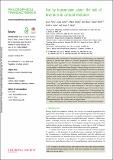Files in this item
Not by transmission alone : the role of invention in cultural evolution
Item metadata
| dc.contributor.author | Perry, Susan | |
| dc.contributor.author | Carter, Alecia | |
| dc.contributor.author | Smolla, Marco | |
| dc.contributor.author | Akçay, Erol | |
| dc.contributor.author | Nöbel, Sabine | |
| dc.contributor.author | Foster, Jacob G. | |
| dc.contributor.author | Healy, Susan D. | |
| dc.date.accessioned | 2021-06-14T12:30:06Z | |
| dc.date.available | 2021-06-14T12:30:06Z | |
| dc.date.issued | 2021-07-05 | |
| dc.identifier | 274356913 | |
| dc.identifier | b6425127-4b54-4d68-a078-3e2b9f0b25a3 | |
| dc.identifier | 85106580545 | |
| dc.identifier | 000651502300003 | |
| dc.identifier.citation | Perry , S , Carter , A , Smolla , M , Akçay , E , Nöbel , S , Foster , J G & Healy , S D 2021 , ' Not by transmission alone : the role of invention in cultural evolution ' , Philosophical Transactions of the Royal Society B: Biological Sciences , vol. 376 , no. 1828 , 20200049 . https://doi.org/10.1098/rstb.2020.0049 | en |
| dc.identifier.issn | 0962-8436 | |
| dc.identifier.other | Jisc: da2ac2a0d8ec4725aed856aa7b249765 | |
| dc.identifier.other | ORCID: /0000-0002-8059-4480/work/94669380 | |
| dc.identifier.uri | https://hdl.handle.net/10023/23352 | |
| dc.description | We are grateful to the Templeton World Charity Foundation, Inc. for funding this work and to the Diverse Intelligences research community for valuable conversations around these themes. S. Nöbel acknowledges IAST funding from the French National Research Agency (ANR) under the Investissements d’Avenir program, grant ANR-17-EUR-0010 and support by the Laboratoires d’Excellence TULIP (ANR-10-LABX-41). EA and MS acknowledge support from the US Army Research Office (W911NF‐17‐1‐0017 to EA). | en |
| dc.description.abstract | Innovation—the combination of invention and social learning—can empower species to invade new niches via cultural adaptation. Social learning has typically been regarded as the fundamental driver for the emergence of traditions and thus culture. Consequently, invention has been relatively understudied outside the human lineage—despite being the source of new traditions. This neglect leaves basic questions unanswered: what factors promote the creation of new ideas and practices? What affects their spread or loss? We critically review the existing literature, focusing on four levels of investigation: traits (what sorts of behaviours are easiest to invent?), individuals (what factors make some individuals more likely to be inventors?), ecological contexts (what aspects of the environment make invention or transmission more likely?), and populations (what features of relationships and societies promote the rise and spread of new inventions?). We aim to inspire new research by highlighting theoretical and empirical gaps in the study of innovation, focusing primarily on inventions in non-humans. Understanding the role of invention and innovation in the history of life requires a well-developed theoretical framework (which embraces cognitive processes) and a taxonomically broad, cross-species dataset that explicitly investigates inventions and their transmission. We outline such an agenda here. This article is part of the theme issue ‘Foundations of cultural evolution’. | |
| dc.format.extent | 11 | |
| dc.format.extent | 356895 | |
| dc.language.iso | eng | |
| dc.relation.ispartof | Philosophical Transactions of the Royal Society B: Biological Sciences | en |
| dc.subject | Creativity | en |
| dc.subject | Cultural evolution | en |
| dc.subject | Individual differences | en |
| dc.subject | Innovation | en |
| dc.subject | Invention | en |
| dc.subject | H Social Sciences | en |
| dc.subject | QH301 Biology | en |
| dc.subject | T-DAS | en |
| dc.subject.lcc | H | en |
| dc.subject.lcc | QH301 | en |
| dc.title | Not by transmission alone : the role of invention in cultural evolution | en |
| dc.type | Journal article | en |
| dc.contributor.sponsor | Templeton World Charity Foundation | en |
| dc.contributor.institution | University of St Andrews. School of Biology | en |
| dc.contributor.institution | University of St Andrews. Centre for Biological Diversity | en |
| dc.contributor.institution | University of St Andrews. Institute of Behavioural and Neural Sciences | en |
| dc.contributor.institution | University of St Andrews. Centre for Social Learning & Cognitive Evolution | en |
| dc.identifier.doi | 10.1098/rstb.2020.0049 | |
| dc.description.status | Peer reviewed | en |
| dc.identifier.url | https://osf.io/preprints/socarxiv/x2acu/ | en |
| dc.identifier.grantnumber | TWCF0210 | en |
This item appears in the following Collection(s)
Items in the St Andrews Research Repository are protected by copyright, with all rights reserved, unless otherwise indicated.

